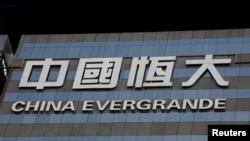Australia’s Reserve Bank, the country’s central bank, has warned that the collapse of Chinese property giant Evergrande Group could cause chaos in China’s financial system.
In its semiannual "Financial Stability Review," the Reserve Bank of Australia acknowledged that Evergrande Group, the heavily indebted Chinese real estate developer, faced a liquidity crisis, or a lack of cash or assets that can be converted easily to cash.
The reserve bank warned that if Evergrande, China’s second-biggest property developer, collapses, it could trigger broader problems in China’s financial and real estate sectors.
Evergrande is facing one of China’s largest-ever defaults, with billions of dollars in debt. Its businesses interests are vast, from wealth management and the manufacture of electric cars to the ownership of one of the country’s biggest soccer teams — Guangzhou FC.
Chinese authorities last year started to restrict the debts of big real estate companies.
Yun Jiang is the managing editor in the School of Regulation and Global Governance at the Australian National University.
“The Chinese government does realize that [the] real estate sector is important to the economy, and, on top of that, it is important for the social stability of China because in China a lot of people’s savings, assets are tied up in real estate, more so than in many other countries,” she said.
China is Australia’s biggest trading partner and experts warn of serious implications for Australia should Evergrande default on its massive loans.
The crisis has already hit the price of Australia’s main export, iron ore, a key ingredient in steelmaking. Analysts warn that China could cut steel production, which would further depress iron ore prices. Commodities have underpinned Australia’s recent prosperity.
Analysts have also warned that Australia’s stock market, and skittish investors, would easily be unsettled if Evergrande went bust.
However, financial observers hope the Chinese government, which governs the world’s second-largest economy, will try to restructure Evergrande’s debt to prevent its collapse. They have stressed that China’s ability to contain a financial meltdown is about to be severely tested, and its success — or failure — would have global implications.





